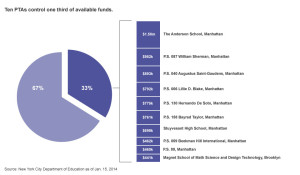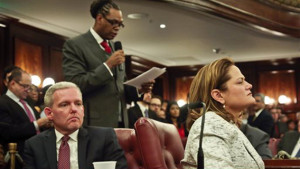Transition tent? More like transition greenhouse.
With bright sunshine heating up the glass roof and walls of the Talking Transition tent on Canal Street, State Senator Daniel Squadron defended his idea to impose a 20 percent tax on city park conservancies that have budgets larger than $5 million a year.
Squadron’s bill — currently in front of the state legislature — proposes that richer, better- funded green spaces, such as Central Park and Prospect Park, share some of their money with parks in need. Mayor-elect Bill de Blasio has supported this plan.
On Thursday afternoon, however, Squadron said he’d be willing to compromise.

The Transition Tent hosted a debate on Thursday about a proposal, supported by Mayor-elect Bill de Blasio, to share wealth raised by more prosperous parks with those that need aid. From left:
Joseph McKellar, executive director of Faith in New York; Adrian Benepe, former Parks commissioner and Senior VP at the Trust for Public Land; Holly Leicht, executive director of New Yorkers for Parks; Tupper Thomas, former executive director of the Prospect Park Alliance; and State Senator Daniel Squadron. Photo: Claire Moses
“Certainly I am open and interested about other proposals around this,” Squadron said. “There’s certainly a conversation to be had about what percentage it is.”
The money would go into a fund, dubbed the Parks Alliance, that would support parks in need of assistance that do not have the benefit of a conservancy or another public-private partnership.
According to the bill, the re-channeling of funds is meant to bring “equity across the city’s 1,700 parks.”
Parks advocates have expressed worries and opposition to the 20 percent clause in Squadron’s bill.
“Why target existing, successful conservancies?” asked Holly Leicht, executive director of New Yorkers for Parks, as well as the moderator of a debate on the topic on Thursday.
Leicht suggested that Squadron’s proposal would “chill” private donations to the large conservancies. But the state senator urged his audience to look at conservancies as pieces of a larger system, rather than separate entities.
“They are all part of a network,” Squadron said. What happens in one park — whether it’s funding, a public-private partnership or something else — has an effect on other parks in the city, he explained.
Squadron contended that sharing the wealth won’t deter anybody from giving money to the conservancies of their choice.
“Call me an optimist,” Squadron said, “but I believe that one of the reasons is because people believe in a better parks system.”
After the discussion on Thursday, Squadron indicated that he is open to reviewing the bill and having conversations to ensure that an alliance will promote equity among parks.
Tupper Thomas, a former park administrator and longtime president of the Prospect Park Alliance, one of the largest conservancies in the city, proposed that the next administration reach out to the private sector for help.
While she said that “government needs to step forward,” she also opposed a tax on the large conservancies.
Squadron, who lost the bid for public advocate to Letitia James in a run-off election, first introduced the idea of a Parks Alliance in an op-ed in the New York Times and introduced his bill in June.









